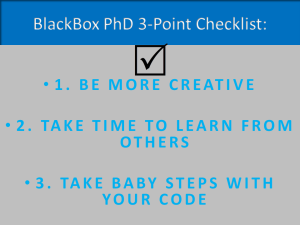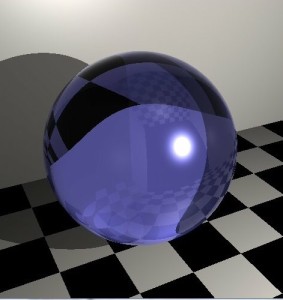Interview with Miaoqi Zhu, a Computer & Social Scientist working in Hollywood

 How are psychology, computer science, and data analysis related? In the past ~40 years, since the early days in computing, there have been a number of attempts at bringing those fields together. The field of cognitive science and cognitive psychology is one example. But with advanced and versatile technologies, 100+ years of insights from psychology, and loads of data to advance the field of data analysis, we have a new wave of work uniting psychology, computer science and data analysis. Miaoqi Zhu is involved with this rising area. In this week’s interview, he tells us about his experience in Software Engineering, Computer Graphics, Psychology, Human-Computer Interaction, and Big Data, and how a new field is erupting combining these areas.
How are psychology, computer science, and data analysis related? In the past ~40 years, since the early days in computing, there have been a number of attempts at bringing those fields together. The field of cognitive science and cognitive psychology is one example. But with advanced and versatile technologies, 100+ years of insights from psychology, and loads of data to advance the field of data analysis, we have a new wave of work uniting psychology, computer science and data analysis. Miaoqi Zhu is involved with this rising area. In this week’s interview, he tells us about his experience in Software Engineering, Computer Graphics, Psychology, Human-Computer Interaction, and Big Data, and how a new field is erupting combining these areas.
Hi, Miaoqi. How did you get involved with software engineering and developing computer graphics?
It is kind of “funny” that I finished my bachelors in a business related major and my masters program focused on Human-Computer Interaction Design. Even coming from this mixed background, I still wanted to pursue my PhD in Computer and Information Sciences. I was lucky to have some options, since I felt that the
type of research I wanted to pursue may be better done in an interdisciplinary program. I then spent the next five years in the College of Computing and Digital Media at DePaul University.
I got involved with Software Engineering because of my research agenda and my interest in Computer Graphics (CG) and Animation. To pick up and sharpen my skills in a short period of time, I took a class in game programming. It was hard as I had to write a game engine from scratch, but in the end I learned tons. I deeply realized that software engineering is just a tool to implement your solutions for a given problem. The key is how to construct the solution rather than the syntax of specific languages. The solution is encapsulated in your algorithm and the implementation requires a solid understanding of your operating system(s) as well as a proficiency in a programming language. Especially for game programming, it is pretty much a
bout performance.
CG and Animation is a field that sees a truly beautiful marriage of art and math. I love it not because of the joy of writing code but the process of deriving math functions based on physics. From ray-tracing to B-spline interpolation, you will be amazed about how math can help us simulate the world and create realistic artwork. In fact, CG and Animation can do more than just art. At DePaul, I used to be with an active group of researchers (http://asl.cs.depaul.edu/) dedicated to American Sign Languages research. Their work aims at using CG and Animation and Computational Linguistics to bridge the communication gap between the deaf and hearing worlds. It is just fantastic.
It appears to me that the industry will expect prospective employees to have some level of programming/scripting skills. With so many free tutorials online, you can certainly take advantage of them.
You have an interesting background having studied social media and modeling video game psychology. Can you tell us about that research and how it led to your current position?
My research in academia and professional work seems unrelated, but they are essentially about the same thing – data. Specifically, my research is to extract useful information from unstructured textual data from social media. The objective is to understand user behavioural and attitudinal patterns of consuming hedonic systems such as computer games. Now in Hollywood, I am very fortunate to work with color scientists to analyze and process imaging data. The goal is to standardize the production pipeline and ultimately give audiences the best cinematic experience.
Another interesting question is: why Psychology? It all comes down to two things: methodology and theory. Technology, from a certain perspective, is similar to a treatment in an “experiment”. A way to apply science to it is to see if it impacts our lives through some variables (e.g., personality, culture). If interested in this direction, you have to rely on the right methodology to produce a good theory. Especially for the social aspect of computing, you cannot really design or control the environment in which people interact with technologies, so you must be very careful in applying methodologies.
I still remember the first time when I went to a Psychology class. People there were confused about why a computer science student was in their class. I explained but most of them still did not quite understand it. I think now they would get it if they read my dissertation. 🙂
My dissertation on computer game playability is inspired by the lexical approach adopted by psychologists. The idea of using a lexical approach in order to obtain human personality traits (if you remember the “Big-Five”) stems from the lexical hypothesis in personality research. The lexical hypothesis states that people will want to talk about personality traits that they observe as having important consequences in their lives. As a result, people will inevitably invent words or phrases to describe those who exhibit high or low levels of these essential traits. Over a long period of time, these terms that describe important traits should become established in every language.

A Basic Demonstration of Phong Illumination Model with Ray Tracing
Likewise, if many game players use a relatively fixed group of terms to express a difference among games, and if this difference entails to the information on game design and associated play experience, these words are by nature the descriptors of games. Therefore, the traits of computer games can be treated as the differences among the experience of playing different games as different players perceive them at different times. Similar to the personality traits, they are distinctive and can be observed over time. As any computer games or other types of software system can thus be described by a finite set of traits, the lexical approach is a logical choice for studying associated user experience. Based on this concept and over millions of online game reviews, I established a glossary for game design and extracted 6 essential traits (i.e., playability, usability, creativity, sensation, competition, strategy) of computer games. Furthermore, a framework was proposed and a list of game design heuristics were developed by interpreting the terms in each trait.
My current work is pertaining to color imaging with a focus on applications for cinema. I developed a strong interest in colors when I was interning in a Visual Effects Studio a few years ago. From the early effort to develop CIE Color Matching functions to the recent trend of High Dynamic Range displays, I feel that the principles of color science can be explained through many disciplines, for example, Mathematics, Physics, Psychology, Biology, Chemistry, etc. Now, in the digital era, you need a Computer’s help to paint each pixel of the image. Fortunately, my interdisciplinary background helped me obtain an opportunity where I could continue interdisciplinary research in the heart of Hollywood.
What languages do you most often use and what do you use them for?
I guess they are C++, Perl and Python. In the film and/or game industry, C++ is a common choice due to high performance and precision. Also, it is likely you will work with various Unix and/or Unix-like systems, so you probably need to get used to coding in a plain text editor and preparing GNU Makefile or CMakeLists files.
I use Perl and Python mostly for data analysis. It is convenient and much faster to get the results. You know they are reliable and there are plenty of open source libraries online.
Can you tell us about some of your favorite packages (in any language), why you like those packages, and what you use them for?
There are many of them. For example: Imagemagick and Scikit-learn. With the former package, you can achieve what Photoshop does (some features) by a few commands. Of course, you gotta be sure about what you want the image to look like in the first place. When it comes to Scikit-learn, I think most data folks understand why I like it, so I am just gonna skip it for now.
What are you most excited about in the future? What do you think your field will look like ten years from now?
Understanding how our brain works and making computers function more like our brain. I also hope that significant progress can be made in the field of quantum computing, as it is really an enabler for many things that we cannot accomplish today. It sounds like a big topic, but it is going to happen. The research in Psychology is an important contributing component to this development as well.
Why are human beings more intelligent than computers (at least now)? Let us focus on just one thing – emotion. Can your computer show a smiley face immediately when reading a message from your Mom? Probably not. If someday computers are smart enough to engender emotions like us, I can imagine that they would quit repetitive tasks we assign to them, although they may “feel” proud because they “know” they can do it in a much faster rate.
If computers can run on the mechanism that the human brain operates on, they may help us make movies too. For instance, perhaps they can read and choose the best script by analyzing public tastes of a specific type of entertainment content; they may also learn from each actor’s profile and brainstorm a character based on how they see the story.
We end off each interview seeing how the insights and work from our interviewees can be applied to people’s lives and work. This interview seems very relevant to engineers working to design code on new topics. What are three key pieces of advice your have for new engineers in your field to keep in mind to improve their work?
- Be more creative. You can do more than writing code. You may be very good at UI design too, you won’t know until you give it a try.
- We all like “Stack Overflow”, but please don’t just copy the solution and move on. Take the time to learn from other people’s solutions!
- Take “baby” steps even if you are very sure about your code, especially for large-scale software.

Pingback: lowongan kerja cpns 2017
Pingback: GVK Biosciences
Pingback: GVK BIO
Pingback: http://www.bv987.com
Pingback: binaural
Pingback: www.cpns2016.com
Pingback: daytrading live
Pingback: chandigarh
Pingback: orospu
Pingback: slot games
Pingback: ADME
Pingback: Aws Alkhazraji
Pingback: assistência informática
Pingback: GVK BIO India
Pingback: law lawDiyala
Pingback: Free UK Chat Rooms
Pingback: Internet Marketing Agency
Pingback: informasi resmi cpns 2018
Pingback: !2ke
Pingback: warehouses for sale
Pingback: 루비게임 엘리트게임 루비게임주소
Pingback: satta matka, satta king, satta, matka, kalyan matka
Pingback: how do I cure premature ejaculation
Pingback: C++ Tutorial
Pingback: oxandrolone reviews
Pingback: free forex signals
Pingback: DMPK services
Pingback: Ambika Ahuja Jaipur Escorts
Pingback: NEHA TYAGI MODEL JAIPUR ESCORTS
Pingback: JAIPUR ESCORTS ALIYA SINHA
Pingback: BANGALORE COMPANION ESCORTS
Pingback: Dhruvi Jaipur Escorts
Pingback: JAIPUR ESCORTS MODEL DRISHYA
Pingback: Heena Khan Bangalore Escorts
Pingback: Jiya Malik High Profile Jaipur Escorts Model
Pingback: FUN WITH JAIPUR ESCORTS PUJA KAUR
Pingback: XXX BANGALORE ESCORTS
Pingback: Selly Arora Independent Bangalore Escorts
Pingback: Enjoy With Jaipur Escorts Tanisha Walia
Pingback: RUBEENA RUSSIAN BANGALORE ESCORTS
Pingback: Bristy Roy Independent Bangalore Escorts
Pingback: Bangalore Escorts Sneha Despandey
Pingback: Kolkata Escorts
Pingback: Goa Escorts
Pingback: smerter
Pingback: Ruby Sen Kolkata Independent Escorts
Pingback: Diana Diaz Goa Independent Escorts Services
Pingback: Diksha Arya Independent Escorts Services in Kolkata
Pingback: Devika Kakkar Goa Escorts Services
Pingback: Rebecca Desuza Goa Independent Escorts Services
Pingback: Yamini Mittal Independent Escorts Services in Goa
Pingback: Simmi Mittal Kolkata Escorts Services
Pingback: Kolkata Escorts Services Ragini Mehta
Pingback: Navya Sharma Independent Kolkata Escorts Services
Pingback: Elisha Roy Goa Independent Escorts Services
Pingback: Alisha Oberoi Kolkata Escorts Services
Pingback: Divya Arora Goa Independent Escorts Services
Pingback: Simran Batra Independent Escorts in Kolkata
Pingback: Ashna Ahuja Escorts Services in Kolkata
Pingback: Sofia Desai Escorts Services in Goa
Pingback: Goa Escorts Services Drishti Goyal
Pingback: Mayra Khan Escorts Services in Kolkata
Pingback: Sruthi Pathak Escorts in Bangalore
Pingback: Ambika Ahuja Jaipur Escorts Services
Pingback: freshamateurs572
Pingback: comment113
Pingback: comment4
Pingback: comment211
Pingback: comment584
Pingback: comment1
Pingback: comment329
Pingback: comment746
Pingback: comment404
Pingback: comment296
Pingback: comment853
Pingback: comment792
Pingback: comment829
Pingback: comment560
Pingback: comment293
Pingback: comment704
Pingback: comment409
Pingback: comment53
Pingback: comment394
Pingback: comment687
Pingback: comment123
Pingback: comment197
Pingback: comment436
Pingback: comment102
Pingback: comment700
Pingback: comment202
Pingback: comment985
Pingback: comment515
Pingback: comment491
Pingback: comment963
Pingback: comment992
Pingback: comment473
Pingback: comment750
Pingback: comment638
Pingback: comment335
Pingback: comment84
Pingback: comment240
Pingback: comment556
Pingback: Sruthi Pathak Bangalore Female Escorts
Pingback: new siriustube471 abdu23na6987 abdu23na18
Pingback: newtube sirius280 abdu23na5114 abdu23na93
Pingback: newtube tube planet209 afeu23na723 abdu23na72
Pingback: tubepla.net download476 afeu23na4364 abdu23na56
Pingback: Sruthi Pathak Bangalore Escorts Services
Pingback: Trully Independent Bangalore Escorts
Pingback: Trully Independent Bangalore Escorts Services
Pingback: Fiza Khan Kolkata Independent Call Girls Services
Pingback: Ruchika Roy Kolkata Escorts Call Girls Services
Pingback: 2019
Pingback: cleantalkorg2.ru
Pingback: #macron #Lassalle
Pingback: a2019-2020
Pingback: facebook
Pingback: facebook1
Pingback: javsearch.mobi
Pingback: Escorts in Kolkata
Pingback: Fiza Khan Kolkata Independent Escorts Call Girls Services
Pingback: Fiza Khan Kolkata Call Girls Escorts Services
Pingback: Diksha Arya Kolkata Escorts Call Girls Services
Pingback: Diksha Arya Kolkata Independent Escorts Call Girls Services
Pingback: freezer jar labels
Pingback: Escorts
Pingback: Cheap
Pingback: Nidika Offer Call Girls in Bangalore
Pingback: we-b-tv.com
Pingback: hs;br
Pingback: tureckie_serialy_na_russkom_jazyke
Pingback: æóêè+2+ñåðèÿ
Pingback: Ñìîòðåòü âñå ñåðèè ïîäðÿä
Pingback: HD-720
Pingback: guardians+of+the+galaxy+2
Pingback: 2020
Pingback: kpop+star+season+6+ep+9
Pingback: Video
Pingback: 1 2 3 4 5 6 7 8 9 10
Pingback: Hyderabad Escorts Call Girls Services
Pingback: movies
Pingback: movies online
Pingback: karan johar
Pingback: Top Movies
Pingback: Movies1
Pingback: 11 10 2019
Pingback: Bangalore Cheap Escorts Sevices
Pingback: smotretonline2015.ru
Pingback: Serial smotret
Pingback: kinokrad
Pingback: kinokrad 2020
Pingback: Watch TV Shows
Pingback: casino
Pingback: Kinokrad 2019 Kinokrad Hd
Pingback: serial 3
Pingback: youtube2019.ru
Pingback: Pune Escorts Services Call Girls
Pingback: serial 2020
Pingback: Dailymotion
Pingback: Watch+movies+2020
Pingback: online pharmacy canada
Pingback: Beograd film 2020
Pingback: psyhelp_on_line
Pingback: coronavirus
Pingback: PSYCHOSOCIAL
Pingback: rasstanovka hellinger
Pingback: Goa Escorts Call Girls Services
Pingback: Bangalore Escorts Services
Pingback: bitly.com
Pingback: buy cheap prescription drugs online
Pingback: buy propecia
Pingback: 500 hemp cbd oil for sale
Pingback: cbd oil
Pingback: best cbd oil
Pingback: erectile dysfunction treatment
Pingback: moskva-psiholog
Pingback: dom2-ru
Pingback: krsmi.ru
Pingback: CFOSPUK
Pingback: MAMprEj
Pingback: fgu0ygW
Pingback: 44548
Pingback: tik tok
Pingback: qwyauuam
Pingback: should you take zithromax when you get whelps on your chest
Pingback: where can i buy amoxicillin over the counter uk
Pingback: lasix 120 mg daily
Pingback: buy azithromycin online australia
Pingback: stromectol in canada
Pingback: ventolin coupon
Pingback: who manufactures synthroid
Pingback: propecia generic name
Pingback: neurontin 100mg capsules
Pingback: metformin causes dementia
Pingback: plaquenil financial assistance
Pingback: The Revenant
Pingback: link
Pingback: psy2022
Pingback: afisha-kinoteatrov.ru
Pingback: top
Pingback: independentlucknowescorts
Pingback: generic amoxicillin
Pingback: buy furosemide 100 mg
Pingback: neurontin cream
Pingback: plaquenil depression
Pingback: prednisone pill
Pingback: no rx avana
Pingback: buy generic provigil
Pingback: stromectol medication
Pingback: ventolin proventil
Pingback: buy generic zithromax
Pingback: neurontin cost uk
Pingback: cheap priligy
Pingback: cheap provigil canada
Pingback: ivermectin canada
Pingback: bimatoprost cost
Pingback: olumiant price
Pingback: pill for covid
Pingback: Anonymous
Pingback: cost of ivermectin
Pingback: ivermectin tablets for humans
Pingback: buy ivermectin stromectol
Pingback: buy stromectol online
Pingback: ivermectin price canada
Pingback: how to purchase sildenafil pills
Pingback: stromectol tab price
Pingback: posologie prednisone 20mg
Pingback: where to buy prednisone
Pingback: molunpiravir
Pingback: ivermectin drug
Pingback: side effects of prednisone in humans
Pingback: casino online usa
Pingback: dr pierre kory ivermectine
Pingback: ivermectin price usa
Pingback: ivermectine et covid
Pingback: casino real money
Pingback: ivermectin for humans dosage
Pingback: ivermectin ebay
Pingback: buy ivermectin cream for humans
Pingback: stromectol stay active
Pingback: buy ivermectin for humans
Pingback: stromectol generic name
Pingback: indian escorts in dubai
Pingback: cheap call girls in lucknow
Pingback: hdorg2.ru
Pingback: call girls in delhi
Pingback: call girls in delhi
Pingback: buy propecia philippines
Pingback: where to buy propecia online uk
Pingback: call girls
Pingback: bangalore call girls
Pingback: bangalore call girls
Pingback: anshika
Pingback: xxx
Pingback: independent escorts in aerocity
Pingback: russian escorts in delhi
Pingback: ghaziabad escorts
Pingback: ghaziabad escorts
Pingback: escrrr
Pingback: indre
Pingback: lcknw
Pingback: cgl